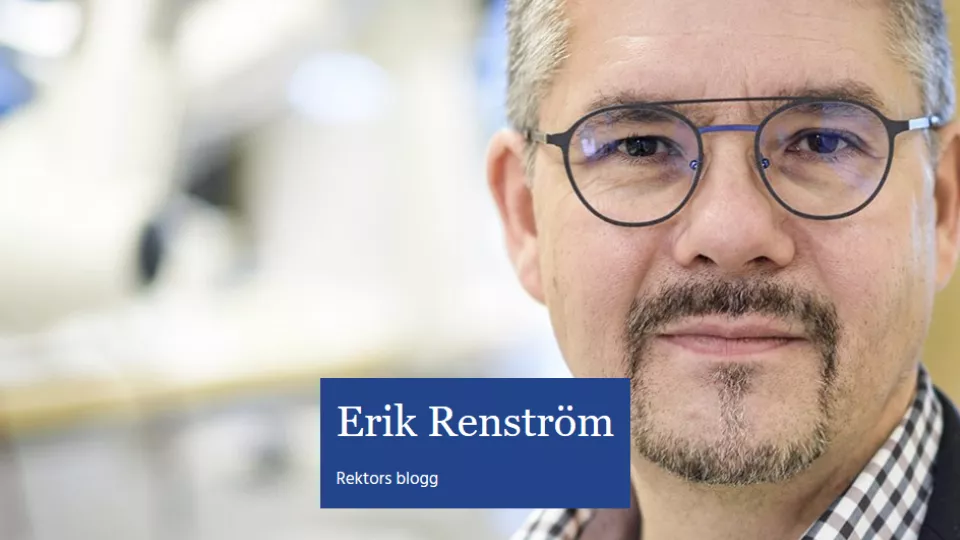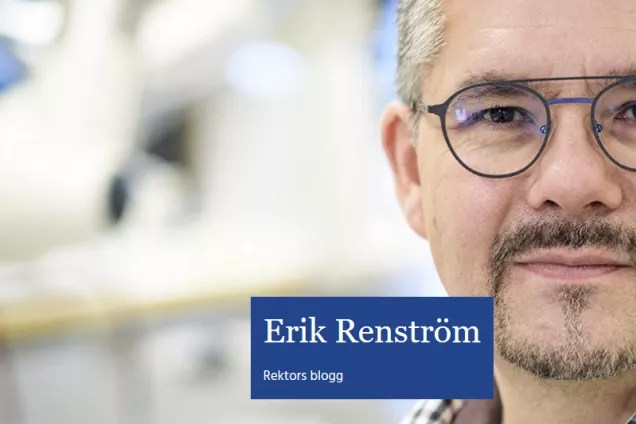Obstacles to internationalisation need to be removed
Published 27 September 2021
Lund University often talks about internationalisation and the importance of working internationally, both through research collaborations and in education. As we live in a globalised era, major and complex issues cannot be resolved other than through international collaboration. The pandemic and climate change are clear examples, showing that we all share the same planet and a need for solutions to problems.
The University’s ambition to be and remain a university in the top international echelon means we also compete in an international arena for the best researchers. Lund University therefore needs to be an attractive employer that provides good conditions for international researchers to contribute to the University’s development. Recruitment is one of our most important future issues, something that was also made crystal clear in the research evaluation, RQ20. There is a lot we can improve through our own efforts – one example is the ongoing project HR Excellence in Research to strengthen and enhance recruitment, and fulfil EU standards.
However, we also need help from others if we are to attract international expertise. As a country Sweden must, for example, have functioning regulations for those who want to come here to conduct research and to be able to stay after earning a doctoral degree. Far from all doctoral students continue their career within the University, but rather prefer to and can work in the business world, industry and the public sector. Sweden as a knowledge nation has fantastic potential in the doctoral students who earn their degrees at Swedish universities.
Lund University has a very high proportion of international doctoral students and they are in the majority at certain faculties. The new Aliens Act, which entered into force in the summer, has been highlighted in the media recently. What consequences will it have for international doctoral students and their ability to stay in Sweden after completing their doctoral studies? Those applying for a permanent residence permit are to be able to support themselves through income from employment or their own company. That is reasonable. However, the Migration Agency’s interpretation of the self-support requirement is unreasonable, as the agency requires employment for an indefinite term or fixed-term employment of at least 18 months from the day the application is assessed. For graduate doctoral students this is hardly a utopia, as recent graduates often move forward in their careers via fixed-term positions, not least within academia.
There are several other problems connected with the Aliens Act and its extensive requirements. The Association of Swedish Higher Education Institutions (SUHF) is now actively working to produce an impact analysis, and a letter will be sent to the Ministry of Education and Research.
Erik
We are a campus university and we will be again this autumn
If there is one thing that we have learned in the last 18 months, it is to operate and lead in times of uncertainty. I am deeply impressed with all the employees and students who have helped to ensure that Lund University’s organisation has managed remote learning and working from home with distinction during the uncertainty that has prevailed, and which to some extent will continue to prevail in the future.
Published 21 June 2021
The pandemic is not over, but even so we can start planning for a return to a campus more in keeping with what we are used to: a campus with people.
With the semester over, and the restricted graduation celebrations behind us, we are now planning for the autumn and a return to campus. Previously, I announced that the return will take place gradually and responsibly and we have now clarified how this will be implemented through a new vice-chancellor’s decision.
The most important points:
- A gradual and orderly adaptation to activities without Covid-19-related restrictions will be implemented at the beginning of the autumn semester 2021, but not earlier than 17 August 2021.
- A gradual and orderly adaptation to education without Covid-19-related restrictions is to be implemented by1 November 2021.
- Study spaces and computer rooms must remain accessible to the greatest possible extent.
- Employees who do not have to be in the workplace to maintain necessary activities are to work from home up to and including 15 September 2021. Employees who must be physically present in the workplace in order to conduct teaching and assessment can return to the workplace earlier.
Restrictions will remain in place this autumn in terms social distancing and the size of groups, and I am aware that it is a daunting task for those in charge of coordinating and planning to be able to cope with the return of thousands of students and employees. At the same time, I hope that units can see the opportunities to try and apply all the experience gained over the last year or so. The need to lead and operate under uncertainty will remain and I think that the past year has shown that we can manage this very well.
Even though ranking lists do not reflect the University’s work during the pandemic in any way, or grade it – it is a bright spot that Lund University has risen significantly in the QS World University Rankings this year!
So, at 87th place in the world ranking and with a creditable silver medal for the best Swedish Covid-19-secure workplace, we have all the prerequisites to continue this fantastic work in the autumn as well!
Erik
Light at the end of the tunnel
Today is a joyful day! Summer has officially begun and as of today the requirement for remote education in higher education has been removed. Teaching on campus is allowed again.
Published 1 June 2021
It is a very pleasing decision that we have all longed for! However, it is the case that education and assessment are already planned for the rest of the spring semester and the current vice-chancellor’s decision will therefore be applied until the start of the autumn semester.
Nevertheless, in the autumn there will be a return to the campus. The signals from the Public Health Agency and the government are clear: the aim is a gradual and responsible resumption. In the autumn there will still be restrictions regarding social distancing and the size of groups. A plan for how this resumption is to be implemented will be presented before the summer break.
Regarding research and other activities, we currently have to adhere to the government decision that working from home is to be the norm in public authorities up to and including 15 September, even though the Public Health Agency intends to remove the general recommendation on working from home on 1 July. This involves challenges for our research and for many doctoral students in experimental research activities who need to be on campus. Discussions are ongoing with public authorities and the government, but we must also see how we can manage this, in a responsible way and with least disruption for the organisation, within the framework of the current decision and existing recommendations on social distancing.
Before the summer break, a plan will also be drawn up for those activities that are not directly linked to education. Here again the watchwords are gradual, socially distanced and judicious.
Now we can really see the light at the end of the tunnel after three semesters unlike any that our generations have experienced! It is enormously pleasing to be able to plan for people to be on campus again, but even so it is not yet full steam ahead, as we still have to adhere to restrictions and guidelines. We will also absorb the lessons learned from these three semesters regarding a more flexible way of working and how digitalisation can help us to reduce travel and gain time for more important tasks.
In late 2020, Lund University’s working group The Covid-19 pandemic’s effect on activities at Lund University: lessons and opportunities for the future identified five prioritised areas: tomorrow’s studies and assessment, tomorrow’s workplace, internal communication, contingency planning and crisis management, and developed decision-making in the University. Significant progress has already been made in these areas and there will be more information on this later. Welcome to the summer season!
Erik
Preparing for autumn while continuing to keep infection control in mind
Published 12 May
Today, I took a new vice-chancellor’s decision clarifying that the planning for the 2021 autumn semester is to be based on teaching and assessment being conducted both on University premises and digitally. Thus we are preparing to be able to open up the University to a greater extent in the autumn. However, until 29 August, teaching and assessment are to continue to take place without attendance on University premises.
With regard to staff, we have not yet taken any new decision beyond the existing requirement to work from home unless you need to be in the workplace to maintain necessary activities. We also encourage students to continue studying primarily from home although we have opened study places.
All information on how the University is managing the Covid-19 pandemic is available at lunduniversity.lu.se/corona.
I hope that the infection rate will improve and that we will see the effects of the vaccine after the summer. One large group, young people, will probably not be completely vaccinated by the start of the semester and a great responsibility will lie with us all to maintain the restrictions concerning social distancing and consideration, even though some age groups will be fully vaccinated by the autumn. I am aware that everyone is exhausted by the restrictions in society and that many people are longing for more normal forms of socialising. The University will loosen the restrictions in place as soon as the green light is given by the authorities responsible, and we are of course closely monitoring developments. Until further announcements are made, I hope that everyone will contribute to avoiding the spread of infection and will think of other, more vulnerable groups in the community. Keep your distance and hold out for a little longer!
There is no doubt whatsoever that staff and students have taken on great responsibility during the pandemic. I am full of admiration for the work that has been dedicated to securing work and study places from an infection perspective and the loyalty and adaptability that everyone has shown over the past year.
Everyone who toiled to get the transition to work recently received great recognition. Lund University was ranked at the top (second best in the country!) among the most Covid-safe workplaces. This emerged from a study conducted by the staffing and recruitment company Randstad which annually measures the attractiveness of the country’s 150 biggest employers. New parts of this year’s survey concerned Covid-19-safe work environments and the possibility of working from home.
I dedicate this top placement directly to all the staff and students who worked hard with everything from taking decisions to adapting premises and finding alternative solutions for social gatherings, teaching and meetings! Wow!
Now that the vaccination programme has reached the lower age groups, many staff members are going to be vaccinated against Covid-19. To facilitate and therefore accelerate the process of having more protected people in our organisation, the University has decided today that employees are entitled to get vaccinated during paid working hours if they cannot find appointments outside office hours.
It is interesting to consider that 37 per cent, according to the survey above, think that a Covid-safe work environment is an important parameter in the choice of employer. Approximately as many, 38 per cent, think that the opportunity to work from home is important. This is something we will bear in mind in our work to continue being an attractive employer.
This week is a short week with the Ascension Day holiday, and I hope that the spring is here to stay and provides rich opportunities to be outdoors.
Enjoy your long weekend!
Erik



